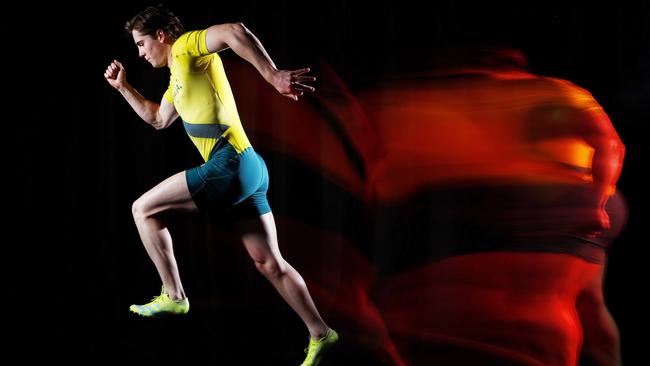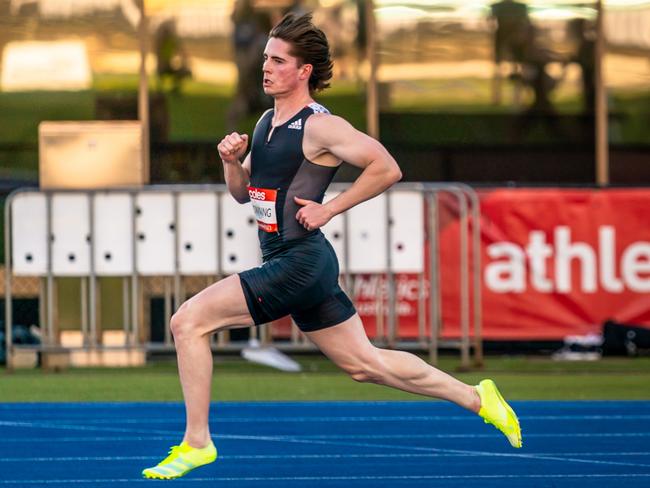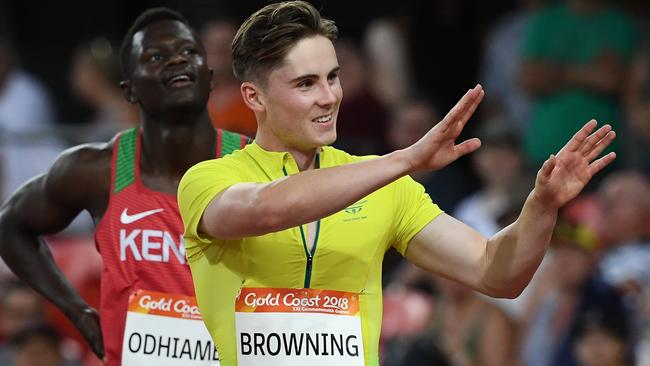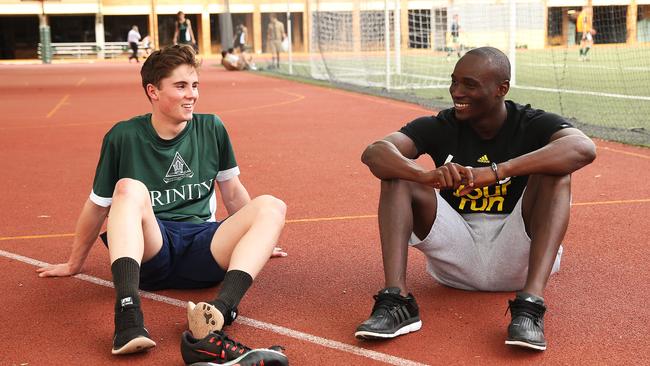Tokyo Olympics 2020: Aussie sprinter Rohan Browning relishing taking on 100m sprint stars
Rohan Browning took 10 seconds to make himself a household name in Tokyo, but his story started long before that. This is how he became our greatest sprint hope.
Olympics
Don't miss out on the headlines from Olympics. Followed categories will be added to My News.
No one is claiming that Rohan Browning’s dad could run out of sight on a dark night, but it’s obvious he can think as fast as his son can run. Which is to say, like lightning.
Proof of that is what happened on the night Rohan was born: December 31 — New Year’s Eve, 1997.
If the birth had taken just a few hours more, Rohan would have been among the first babies born in the new year of 1998. Meaning that for the next 18 years or so, he would have had the benefit of being up to a year older than opponents in any under-age competition.
Kayo is your ticket to the best local and international sport streaming Live & On-Demand. New to Kayo? Try 14-days free now >

Rohan’s father, Andrew, had a flash of inspiration as soon as the new-born drew his first breath … his baby boy might end up on the athletics track or football ground.
Whereas most first-time fathers are stunned by the miracle of birth, reduced to a quivering jelly of pride and fear, Browning senior saw the chance to jam his foot in a sliding door moment.
He took the obstetrician aside and put the case for forgetting about the registration details until the next day — in other words, simply marking down baby Browning’s birth date as January 1.
Rohan’s mother, Elizabeth, was mortified that her husband was so cool and calculating about working a long-range angle with their brand new baby. The doctor was not the sporting type: he agreed with Elizabeth and played precisely by the clock and the calendar.
The result of that, says Rohan Browning sardonically 23 years and four months later, is “I’ve missed out winning at least two junior age records and a youth record”.
The third fastest Australian of all time now laughs about all that, even if he can’t help pointing out that a lousy six hours and a strictly-by-the-book doctor cost him a lot of teenage glory.
But as the clock ticked down to the Tokyo Olympics, the prospect of running for Australia in the 100m against the fastest humans on the planet blocks out everything except the ultra-fine tuning a sprinter needs to stay at the elite end of the sport.
Every morning when Rohan wakes up at 6.30am, he checks his heart rate. At this time of year, it is nearly always below 50bpm, one hallmark of the fit athlete. After that, the training routine unfolds exactly as he wants it to.

Football coaches and sophisticated horse trainers talk about “one percenters” but one per cent is too crude a fraction for a specialist sprinter. Over the 100m course, the calibrations between winning and losing and irrelevance are so fine that imperceptible fractions matter.
Rohan Browning is not just a runner but a student of running. He studies the runners who have gone before him and the ones he’s up against. He thinks about every aspect of the sport that he came to relatively late. His coach has taught him that at the highest level, athletics is mostly in the mind.
Peak physical fitness and the necessary machinery of reflexes and the subtle geometry of bone and fast-twitch muscle are a given in elite sport, leaving aside injury or illness. After that, it’s getting the brain to send the right signals at exactly the right times.
Browning came to running from the team sports that he grew up with. As a youngster, he wanted to play rugby union a lot more than he ever wanted to run at Little Aths. So he did, right up until he left his small independent school, Inaburra, in “The Shire” in Sydney’s sprawling southern suburbs, at the end of Year 8.
He had won a scholarship to Trinity Grammar in inner-suburban Summer Hill — but not because Trinity was buying up athletic talent the way many do. Rohan’s was an academic scholarship. It just so happens that his blossoming athletic ability came along with the agile brain that has since got him into university law school.
When he first got to Trinity, he was determined to make the first XV in his senior years. But when it turned out that he loved rugby more than it loved him, he switched to athletics.
The law of unintended consequences kicked in: his brief disappointment about his middleweight rugby ability led to making the most of his emerging talent on the track. Talent is one thing but no use without motivation, and he had plenty of that.
He also had a mentor who was astute enough to seize the moment. This was Trinity’s longtime athletics coach, triple Olympic representative Andrew Murphy. The former triple jumper saw something in young Browning and fostered it: call it the blend of mindset and muscle twitch.

“I saw him playing rugby and I saw he had some speed,” Murphy recalls.
“It was just raw speed. But he was not an overly big kid and was still under developed.” In other words, the scholarship boy had untapped potential.
When Murphy got the small rugby player on to the running track, he taught him how to improve his running mechanics. While he refined that, the combination of puberty and strength training turned the quick kid into a serious runner.
Still, says Murphy, the most important moment of all was mental, rather than physical. It was when the teenager realised: “Maybe I could be good at this.”
It is possible the wily coach involved his even wilier wife, Liz, in luring the talented teenager to concentrate on the running track. The fact that the Murphys have the same first names as Browning’s parents (Andrew and Elizabeth) meant he was always well disposed towards them both. They are a second family.
It was Liz Murphy who tipped Rohan a good reason to switch from rugby to running: her argument, based on three decades in athletics, is that star runners attract far more female admirers than average rugby players. He instantly saw the wisdom of this.
Ironically, it was training so hard for the rugby field that made the difference to Browning’s body for running. In 2014 he spent a season in the gym building his strength. It paid off, just not in the way he’d originally imagined it would.
In March 2014, Rohan ran the 100 in 11.13 seconds. By that September, after months of gym work for rugby, he ran 10.9. Then in the next two months, he ran 10.47 “legal”, 10.39 wind assisted then the astonishing time of 10.18, albeit wind assisted.

Suddenly he was the second fastest in the world in his age group. It was an amazing progression, but was a case of training and motivation dovetailing precisely with the year when his body was gaining strength.
Wise old horse trainers say about apprentice jockeys — tiny as 15-year-olds — that they usually “get too big” in the winter of their 17th year. They believe it is the season when slow developers gain strength and size.
Maybe the old-timers are right. In the winter of his 17th year, Browning grew from just another promising schoolboy athlete to a serious contender.
To a sprinter, the difference between just over 10 seconds and just under 11 seconds is the world. But to break the 10-second barrier is the Holy Grail, the one Browning aimed for ever since that stellar junior year in 2014.
It happened on January 17 at Wollongong in the Illawarra Track Challenge. Browning led a strong field across the line, sparking jubilant scenes when it sunk in that he had run 9.96 seconds, albeit “illegally” because of the tailwind.
Wind or not, something about breaking barriers is infectious. One delighted watcher called out: “If you can do it with the wind you can do it without!”
Others rushed to congratulate him on becoming the fastest man in the land after Patrick Johnson, who recorded a legal 9.93 in 1993. (Although, of course, Browning’s official “legal” mark is 10.05, a tick slower than Matt Shirvington’s 10.03 in 1998.)
So where does the speed come from? Rohan is the only runner of the family. His two younger brothers play team sport but dodge athletics the way he used to. The family jokes that “the test tubes got mixed up”, a reference to Rohan being an IVF baby. But all three boys look like each other so the joke is exactly that … a running joke.

Browning has his mentors. He says cricket legend Steve Waugh helps him by discussing the challenges of staying grounded in professional sport. Former sprinting champ Shirvington keeps in touch, a link with the sport’s recent past — and the time he has to beat without wind assistance to have any chance in world competition.
But Andrew Murphy is the difference between a handy schoolboy rugby player and Australia’s best sprinting hope since the 1990s.
“Murph is fantastic,” Browning says of the veteran of three Olympics and world titles.
“He appreciated my teachability. He’d bring the expertise but there is constant dialogue between us. I’m not dictated to — but I’m always this 12-year-old desperate to impress him.”
He and Murphy think a runner develops for around 10 years from when they first get serious coaching as teenagers. That means Browning should peak at around 27 years old and, bar injury, hold his form for maybe another four years after that.
Here’s the Games plan. Whatever Browning does at Tokyo, he will be better at the Paris Olympics in 2024. And chances are he’ll still be in the running when Los Angeles comes around in 2028.
Long before then, of course, he will have graduated from university. He will be the fastest lawyer in the land for quite a while after that.





